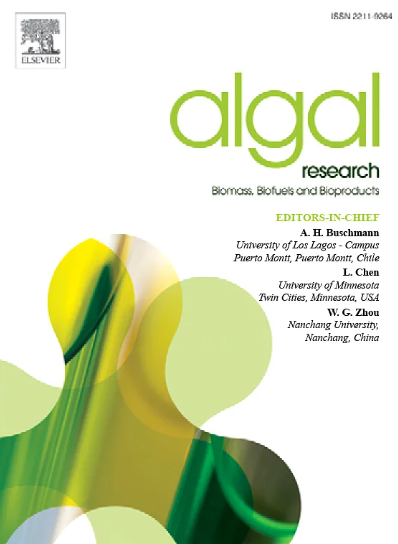CRISPR/Cas9-engineered thermotolerant Saccharomyces cerevisiae JAYET for enhanced 3G-ethanol production from Chlorella vulgaris biomass
IF 4.5
2区 生物学
Q1 BIOTECHNOLOGY & APPLIED MICROBIOLOGY
Algal Research-Biomass Biofuels and Bioproducts
Pub Date : 2025-08-01
DOI:10.1016/j.algal.2025.104275
引用次数: 0
Abstract
The production of third-generation (3G) ethanol from microalgae-derived carbohydrates requires a cost-effective hydrolysis strategy and a robust fermenting microorganism. In this study, the amyA gene encoding α-amylase from Aspergillus tubingensis was integrated into the genome of the thermotolerant Saccharomyces cerevisiae JAYET strain using CRISPR/Cas9. JAYET was previously derived from the industrial PE-2 strain and engineered for cellulase production. The CRISPR/Cas9 system enabled efficient genome editing and construction of a synthetic yeast strain, named JAYCA. The performance of the engineered strain was evaluated under different fermentation strategies (SHF, SSF, pSSF), temperatures (30 °C and 40 °C), and compared with parental strains. JAYCA showed strong growth on starch agar, confirming successful expression of extracellular α-amylase. During fermentation of carbohydrate-rich Chlorella vulgaris biomass, JAYCA achieved 92.1 % of the theoretical ethanol yield using Separate Hydrolysis and Fermentation (SHF) at 30 °C. The highest ethanol concentration (16.41 g·L−1) was obtained under Simultaneous Saccharification and Fermentation (SSF), combining α-amylase and amyloglucosidase activity. These results demonstrate that the engineered yeast effectively converted microalgal carbohydrates into ethanol, achieving high 3G ethanol titers through an eco-friendly Consolidated Bioprocessing (CBP) strategy based on enzymatic hydrolysis and renewable biomass. This is the first report of applying the engineered JAYCA strain in a microalgae-based CBP strategy for 3G ethanol production.
CRISPR/ cas9工程的耐热酿酒酵母JAYET增强了小球藻生物质的3g乙醇生产
从微藻衍生的碳水化合物生产第三代(3G)乙醇需要具有成本效益的水解策略和强大的发酵微生物。本研究利用CRISPR/Cas9技术,将来自tubingaspergillus tubingensis的编码α-淀粉酶的amyA基因整合到耐温酿酒酵母(Saccharomyces cerevisiae) JAYET菌株的基因组中。JAYET以前是从工业PE-2菌株中衍生出来的,用于纤维素酶的生产。CRISPR/Cas9系统实现了高效的基因组编辑和合成酵母菌株JAYCA的构建。在不同的发酵策略(SHF、SSF、pSSF)、温度(30°C和40°C)下,对工程菌株的发酵性能进行了评价,并与亲本菌株进行了比较。JAYCA在淀粉琼脂上生长旺盛,证实了细胞外α-淀粉酶的成功表达。在富含碳水化合物的小球藻生物质发酵过程中,采用分离水解和发酵(SHF), JAYCA在30°C下达到92.1%的理论乙醇产率。结合α-淀粉酶和淀粉葡糖苷酶的活性,同时糖化发酵(SSF)的乙醇浓度最高,为16.41 g·L−1。这些结果表明,工程酵母有效地将微藻碳水化合物转化为乙醇,通过基于酶水解和可再生生物质的生态友好的综合生物处理(CBP)策略获得高3G乙醇滴度。这是应用工程JAYCA菌株在微藻为基础的CBP策略3G乙醇生产的第一份报告。
本文章由计算机程序翻译,如有差异,请以英文原文为准。
求助全文
约1分钟内获得全文
求助全文
来源期刊

Algal Research-Biomass Biofuels and Bioproducts
BIOTECHNOLOGY & APPLIED MICROBIOLOGY-
CiteScore
9.40
自引率
7.80%
发文量
332
期刊介绍:
Algal Research is an international phycology journal covering all areas of emerging technologies in algae biology, biomass production, cultivation, harvesting, extraction, bioproducts, biorefinery, engineering, and econometrics. Algae is defined to include cyanobacteria, microalgae, and protists and symbionts of interest in biotechnology. The journal publishes original research and reviews for the following scope: algal biology, including but not exclusive to: phylogeny, biodiversity, molecular traits, metabolic regulation, and genetic engineering, algal cultivation, e.g. phototrophic systems, heterotrophic systems, and mixotrophic systems, algal harvesting and extraction systems, biotechnology to convert algal biomass and components into biofuels and bioproducts, e.g., nutraceuticals, pharmaceuticals, animal feed, plastics, etc. algal products and their economic assessment
 求助内容:
求助内容: 应助结果提醒方式:
应助结果提醒方式:


